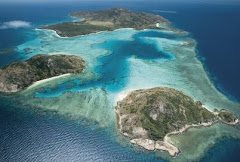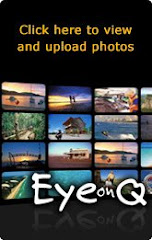
On the contrary, like Australia or Queensland in particular, tourism is a threat to the social, ecological and cultural dimensions of the region. In other words, there are environmental challenges and issues that need to be addressed in GBR both for the short and long term periods.
One of the members of Island caretaker Ning's community website asked me some basic questions on relation to environmental management of GBR as part of my application - being the first Filipino Island Caretaker of this world heritage site.
Many people are interested in visiting Queensland because of this promotion. What do you think about the effects of mass fly-in tourism on the environment?
Generally, it will entails additional routes/schedules both land, sea and air going to the region which somehow leads to the increase of traffic and additional usage of aircrafts, at the same time more land travel both cars and trains, including commercial/domestic vessels. With this increase in the various modes of transport going in and out of the region, more pollution will be created on air, water and land.
Specifically, there are short and long-term direct impacts of recreational and marine tourism on the environment. Some of these effects will manifest immediately and some of them will be compounded through time if these problems will not be addressed accordingly.
With this global job search for GBR, it is expected that more visitors will travel to the region which could bring additional ecological, social and cultural impacts. These impacts are explicitly identified in the CRC Reef Research Centre's 2003 report.
What do you think are the unique environmental challenges faced by the Great Barrier Reef?
Mainly, these challenges are mostly directed to activities created by tourists and business operators such as follows: (a) water based activities (diving, snorkeling, fishing); (b) marine life interaction (watching of whales, turtles, seabirds, fish feeding); (c) ship/boat related activities (anchoring, mooring, fishing, racing); and waste generation (liquid and solid wastes from the above activities).
This is "not" really unique to GBR, but also happening to other islands around the world, like in my home country the Philippines which has 7,107 islands. Unlike GBR, the Philippines is experiencing more degradation of marine life because of illegal fishing through using explosives and large-scale commercial fishing.
If you win the position, how would you like to showcase the message of environmental protection?
A six-month contract is not enough to focus on these environmental issues and challenges that this marine eco-system is facing. But in my own little way and initiative, taking advantage of my position as the island caretaker, I will do my best to identify short term strategies to mitigate these impacts for QT to implement towards proper long term management of this heritage site.
In addition, hopefully maintaining a blog and media exposure will increase the awareness of people on practical and simple things to save these corals and other marine life in GBR. Regular consultations with the local people, operators and tourists will be a strategy to bring out the importance of environmental protection.
What I am really envisioned during my employment, aside from doing my regular responsibilities, I will do a massive campaign on solid waste management. Brochures and flyers will be distributed to all business establishment operators and the like, which are readily accessible to visitors and guests. These materials highlight relevant information on basic tips on enjoyable stay without a significant "footprint" on GBR. Finally, this information dissemination campaign could also cover DO'S and DON’TS while visiting the world heritage site in terms of restrictions on bringing-out marine specimen as souvenirs and promoting codes-of-practice in snorkeling, fishing and diving.
What do you think? Am I qualified to do the job?
Well, my environmental slogan for the Great Barrier Reef (GBR) is Go...Ban...Rubbish
Click the image for one of the useful links for Marine Debris.






No comments:
Post a Comment